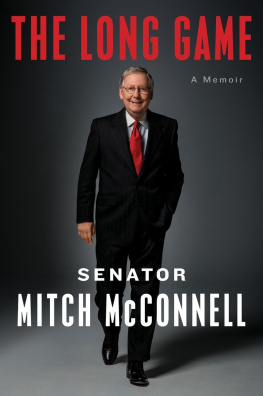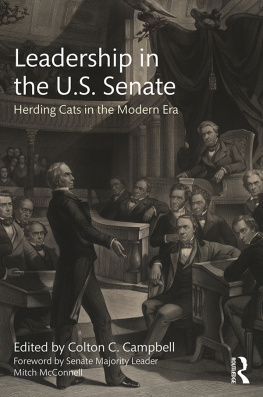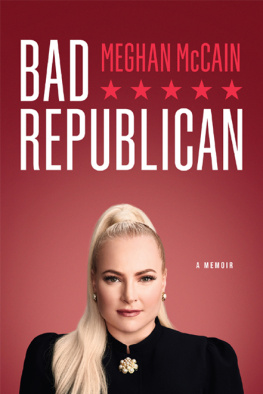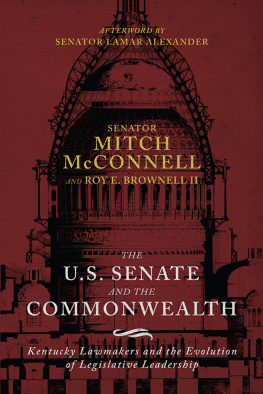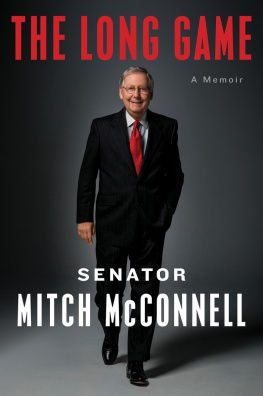McConnell - The long game: a memoir
Here you can read online McConnell - The long game: a memoir full text of the book (entire story) in english for free. Download pdf and epub, get meaning, cover and reviews about this ebook. City: Kentucky;United States, year: 2016, publisher: Penguin Publishing Group;Sentinel, genre: Politics. Description of the work, (preface) as well as reviews are available. Best literature library LitArk.com created for fans of good reading and offers a wide selection of genres:
Romance novel
Science fiction
Adventure
Detective
Science
History
Home and family
Prose
Art
Politics
Computer
Non-fiction
Religion
Business
Children
Humor
Choose a favorite category and find really read worthwhile books. Enjoy immersion in the world of imagination, feel the emotions of the characters or learn something new for yourself, make an fascinating discovery.
The long game: a memoir: summary, description and annotation
We offer to read an annotation, description, summary or preface (depends on what the author of the book "The long game: a memoir" wrote himself). If you haven't found the necessary information about the book — write in the comments, we will try to find it.
The long game: a memoir — read online for free the complete book (whole text) full work
Below is the text of the book, divided by pages. System saving the place of the last page read, allows you to conveniently read the book "The long game: a memoir" online for free, without having to search again every time where you left off. Put a bookmark, and you can go to the page where you finished reading at any time.
Font size:
Interval:
Bookmark:


SENTINEL
An imprint of Penguin Random House LLC
375 Hudson Street
New York, New York 10014
penguin.com
Copyright 2016 by Mitch McConnell
Penguin supports copyright. Copyright fuels creativity, encourages diverse voices, promotes free speech, and creates a vibrant culture. Thank you for buying an authorized edition of this book and for complying with copyright laws by not reproducing, scanning, or distributing any part of it in any form without permission. You are supporting writers and allowing Penguin to continue to publish books for every reader.
PHOTOGRAPH CREDITS
Insert : From The Courier-Journal, June 23, 1996, 1996 Gannett-Community Publishing. All rights reserved. Used by permission and protected by the copyright laws of the United States. The printing, copying, redistribution, or retransmission of this content without express written permission is prohibited.
Credits for other photographs appear adjacent to the respective images.
ISBN 9780399564109 (hardcover)
ISBN 9780399564123 (ebook)
Penguin is committed to publishing works of quality and integrity. In that spirit, we are proud to offer this book to our readers; however, the story, the experiences, and the words are the authors alone.
Version_1
To my mom and dad
O ver the three decades I have been a US senator, Ive been the subject of many profiles. I usually play the villain, according to the standard good guy/bad guy accounts favored by most Washington reporters. The more positive ones tend to focus on my ability to broker deals with supposed adversaries, keep my head when others dont, and win elections Im not supposed to. Until now, though, no one has ever tried to write the story as I see it, which is really my doing. I only talk to the press if its to my advantage, and I always discourage my staff from revealing details of my meetings with presidents and other public figures. Its rare that I attend the kind of social events where people tend to engage in the gossip and intrigue for which Washington is famous. Ive only been to Nantucket a few times, and I didnt like it. My idea of a good time is a quiet evening at home with my wife, Elaine Chao, oralthough I may hardly strike people as the tailgating typegathered with friends in the parking lot of the University of Louisvilles Papa Johns stadium, before a Cardinals football game, a tradition Ive enjoyed for decades.
Beyond that, the place I feel most at ease is the Senate, an institution that rewards patience and confounds those who lack it. Every serious student of the institution, from Tocqueville to my late colleague Robert Byrd, has viewed the Senate as uniquely important to Americas stability and flourishing. In their view, as well as in mine, it has made all the difference. Why? Because during the most contentious and important battles throughout our nations historyfrom the fierce early fights over the shape and scope of the federal government, to those that preceded and followed a nation-rending Civil War, to those surrounding the great wars of the twentieth century, or a decades-long Cold War, or the war on terrorthe Senate is the tool that has enabled us to find our footing almost every time.
At its best, the Senate exists to keep the government from swinging between extremes as one party loses power and another gains it. The Senate is the only legislative body on earth where a majority is not enoughmost things require sixty votes to pass. Without this moderating effect, todays majority passes something and tomorrows majority repeals it; todays majority proposes something, tomorrows majority opposes it. We see that in the House of Representatives all the time. But when the Senate is allowed to work the way it was designed tomeaning a place where nothing is decided without a good dose of deliberation and debate, as well as input from both the majority and minority partiesit arrives at a result that is acceptable to people all along the political spectrum.
In recent years, however, weve lost our sense for the value of slow and steady deliberation, for the type of work that depends more on patient diplomacy than on power plays and media manipulation. Under Democratic leader Harry Reid, the Senate Chamber frequently became little more than a Democratic campaign studio. Many of the bills that Reid allowed for consideration were bills his party did not intend to pass. And none of usno senator, no Americanshould be at peace with that. Because if America is to face up to the challenges we face in the decades ahead, shell need the Senate the Founders in their wisdom intended, not the hollow shell of the Senate created in recent years under Reid.
No better example exists of this than the story behind the passage of Obamacare. When Democrats in the Senate couldnt convince even one Republican that this bill was worth supporting as written, they decided to do it on their own and pass it on a party line vote. And now were seeing the result. The chaos this law has visited on our country isnt just deeply tragic, it was entirely predictable. That will always be the case if you approach legislation without regard for the views of the other side. Without some meaningful buy-in, you guarantee a food fight. You guarantee instability and strife. It may very well have been the case that on Obamacare, the will of the country was not to pass the bill at all. Thats what I would have concluded if Republicans couldnt get a single Democratic vote for legislation of this magnitude. But Democrats plowed forward anyway. They didnt want to hear it and the results are clear. Its a mess.
The problem, admittedly, originates not solely from the Left alone, but also, disappointingly, from a very few on the Right. Just as the Democrats have used every gimmick to push through radically liberal policies, some on the Right have demanded that if they dont get every single thing they want, we may as well burn the place down, even if it means scorching the reputation and future success of our own party. People are not elected to the Senate to get everything they want. This is not an all-or-nothing place. And these are not the type of people we want to be the leaders in the Senate, or of anything else.
A big part of the problem with the Senate today is the way many politicians on both sides of the aisle style themselves as saviors. Its not only self-serving nonsense in most cases, its exploitative of the voters. And it reflects a fundamentally un-American view of how our political institutions were meant to function. The proper basis of government, James Madison believed, was human frailty. Thats why it was just as important to Madison, in devising the government we have, not only to protect the people from their own worst impulses, but also to protect them from the worst impulses of those they put in office. And thats also why the moment we conclude that our political institutions are no longer up to the task of resolving the challenges we face is the moment we give up on the American project altogether. Why? Because in the end its the institutions, not the flawed men and women who pass through them, that will save us from ourselves and from the politicians were all so fond of criticizing.
All these things have always seemed obvious to me, to the point that I never felt the need to unburden myself of any of it in a book, let alone tell my own story. But Ive come to realize that those ideasand many other constitutional principlesare anything but obvious to most people today. And when I was reelected in 2014, winning by a fifteen-point landslide against all odds and attracting a level of attention I could only find amusing, I realized it was time for me to write this book.
Font size:
Interval:
Bookmark:
Similar books «The long game: a memoir»
Look at similar books to The long game: a memoir. We have selected literature similar in name and meaning in the hope of providing readers with more options to find new, interesting, not yet read works.
Discussion, reviews of the book The long game: a memoir and just readers' own opinions. Leave your comments, write what you think about the work, its meaning or the main characters. Specify what exactly you liked and what you didn't like, and why you think so.

